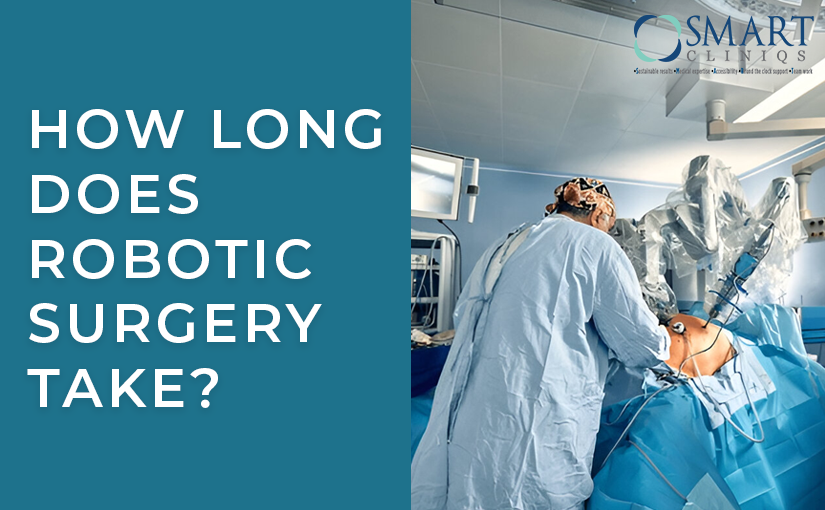Robotic surgery has revolutionized the field of medicine, offering advanced surgical techniques that provide improved precision, quicker recovery times, and smaller incisions compared to traditional surgery. One of the most common questions patients ask when considering robotic surgery is, How long does robotic surgery take? This question is crucial for patients who are preparing for surgery, as understanding the duration can help them plan accordingly and manage expectations.
In this blog, we will explore the factors that influence the time it takes for robotic surgery, the advantages it offers, and how Robotic Surgery in Delhi is becoming increasingly popular for a variety of procedures. We will answer the question, how long does robotic surgery take, and provide useful insights into the entire process.
What is Robotic Surgery?
Robotic surgery refers to a type of minimally invasive surgery where a surgeon uses robotic arms controlled by a computer to perform the procedure. The surgeon controls the robotic arms from a console, which provides a highly magnified 3D view of the surgical area. The robotic system allows for greater precision, flexibility, and control than traditional surgery.
Robotic surgery can be used for a variety of procedures, including:
- Prostatectomy (removal of the prostate)
- Kidney surgery
- Hysterectomy (removal of the uterus)
- Gallbladder surgery
- Heart surgery
- Weight loss surgery (bariatric surgery)
Robotic Surgery is becoming increasingly popular due to the benefits it offers, including faster recovery times, reduced risk of complications, and less post-surgical pain.
How Long Does Robotic Surgery Take?
The duration of robotic surgery varies depending on the type of procedure, the complexity of the surgery, and the patient’s condition. However, in general, robotic surgery tends to take longer than traditional surgery due to the preparation, setup, and precision required for the robotic system.
1. Preparation Time
Before the actual surgery begins, there is a preparation phase where the surgical team sets up the robotic system, prepares the patient, and ensures that everything is in place. This preparation can take anywhere from 30 minutes to 1 hour, depending on the procedure. During this time, the patient will be positioned on the operating table, and the robotic arms will be calibrated to ensure accurate movement during surgery.
- What to Expect: During the preparation phase, the surgeon will review the patient’s medical history, explain the procedure, and discuss any concerns. The patient will be given anesthesia, and the surgical area will be cleaned and marked.
2. Procedure Duration
Once the robot is set up and the patient is properly positioned, the surgeon will begin the procedure. The duration of the actual surgery varies depending on the complexity of the procedure. On average, robotic surgery takes about 1 to 4 hours.
- Simple Procedures: For simpler procedures, such as gallbladder removal or appendix surgery, robotic surgery may take 1 to 2 hours.
- Complex Procedures: For more complex surgeries, such as prostatectomy or kidney surgery, the procedure may take 3 to 4 hours or more.
While the actual surgical time is important, the precision of robotic surgery allows for smaller incisions and better control, reducing the overall trauma to the body and speeding up recovery.
3. Factors Affecting the Duration of Robotic Surgery
Several factors can influence the length of time a robotic surgery takes:
- Type of Surgery: As mentioned earlier, the type of surgery is one of the most significant factors affecting the duration. Complex procedures that require detailed dissection or multiple organ manipulation tend to take longer.
- Surgeon’s Experience: The more experienced the surgeon is with robotic systems, the more efficiently they can perform the surgery. An experienced surgeon can complete the procedure faster while maintaining high levels of precision.
- Patient’s Anatomy: The patient’s anatomy, including factors such as obesity, scar tissue from previous surgeries, or other medical conditions, can affect the difficulty of the surgery and thus the time required.
- Technology Setup: Some surgeries may require more extensive setup of the robotic system or specialized instruments, which can add time to the overall procedure.
4. Post-Surgery Time
After the robotic surgery is completed, the patient will be moved to the recovery room for observation. This post-operative period generally lasts for 1 to 2 hours. The recovery time depends on the type of surgery and the patient’s overall health. Many patients can go home the same day or after a short hospital stay.
- What to Expect: In most cases, patients experience less pain, swelling, and bleeding after robotic surgery compared to traditional surgery, which contributes to a faster recovery. However, the exact recovery time will depend on the surgery performed and the individual.
Advantages of Robotic Surgery
The question, how long does robotic surgery take, is often followed by questions about the advantages of this surgical method. Here are some benefits that make robotic surgery a preferred choice for many patients:
1. Greater Precision
One of the main advantages of robotic surgery is the increased precision it offers. The surgeon can control the robotic arms with fine-tuned accuracy, allowing them to perform delicate maneuvers that would be difficult or impossible with traditional surgical tools. This precision minimizes tissue damage and reduces the risk of complications.
2. Minimally Invasive
Robotic surgery is minimally invasive, meaning that it involves smaller incisions compared to traditional surgery. Smaller incisions lead to less bleeding, a reduced risk of infection, and a quicker recovery time. Most patients experience less post-operative pain and discomfort, allowing them to return to normal activities sooner.
3. Faster Recovery Time
Because of the minimally invasive nature of robotic surgery, the recovery time is typically faster than traditional open surgery. Patients are usually able to go home the same day or after a short hospital stay. In many cases, they can return to work and daily activities within a few days to weeks, depending on the procedure.
4. Reduced Risk of Complications
Robotic surgery’s precision, along with the ability to perform procedures with minimal disruption to surrounding tissues, leads to a lower risk of complications. The risk of infection, bleeding, and scarring is significantly reduced compared to traditional surgery.
Conclusion
In conclusion, how long does robotic surgery take? While the duration can vary depending on the type of surgery and the patient’s specific condition, most robotic surgeries last between 1 to 4 hours. The procedure is generally less invasive, which leads to a faster recovery time and fewer complications.If you are considering robotic surgery, it is essential to consult with a qualified surgeon who specializes in this advanced technique. Dr. Atul Peters and his team provide exceptional care for patients undergoing Robotic Surgery in Delhi, ensuring a smooth surgical experience and a quick return to normal life. Contact Dr. Atul Peters today for a consultation to discuss how robotic surgery can benefit you and to answer any further questions you may have about the surgery, recovery time, and results.









